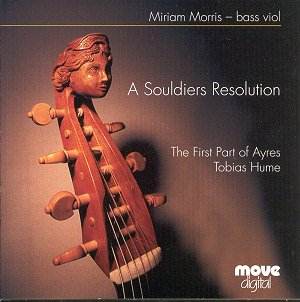
Available from Divine Art |
Tobias HUME
(1569 ? - 1645) A Souldiers Resolution The First Part of Ayres A Pavin Faine would I change that note * A Souldiers Resolution A Question An answere Death Life Good againe What greater griefe * Rosamond The Duke of Holstones Almaine My Mistresse hath a prettie thing Adue sweete Love Be merry a day will come Tobacco * Beccus an Hungarian Lord his delight The second part Loves farewell Miriam Morris, bass viol Christopher Field, countertenor * Rec: 1999 ?. |
The first time I heard the music of Captain Tobias Hume, more than 15 years ago, it was a revelation. I had never heard any music that sounded so otherworldly, so uniquely vibrant and haunting at the same time. This was Jordi Savall's groundbreaking 1982 recording (Musciall Humors, on Astree - Auvidis). It took many years for other musicians to record Hume's works. Perhaps it was because solo viol music was a hard sell; or maybe musicians didn't dare play such music, for fear of alienating their audiences. Times have changed, though, and there are now several recordings of Hume's music for solo viola da gamba available. Yet, while many recital discs include his works, it seems that the only discs available that feature only the music of Tobias Hume are the Savall recording and two discs on Naxos. Miriam Morris's recent release is a welcome addition to this discography.
It is interesting that, of the 13 pieces on the Savall recording, Morris plays 10 - naturally, Savall chose some of the finest pieces, but there are other gems in Hume's repertoire. One can only hope she will record more of his music to dig out some of the lesser-known works.
This is an excellent recording, and Miriam Morris shows her total understanding of this music. Hume's works can sound as if they are being improvised, and the violist needs to express this spontaneity. Morris does so very well. The first piece, A Pavin, one of the longest on the disc, comes through as the perfect preface to the set. It contains all of the many aspects of this music and its performance. Morris shines in these long pieces, such as the final piece, Captaine Humes Pavin, which, at over 8 minutes, is an entire musical discourse for a single instrument. Morris' performance of this piece is magnificent - one can hear the subtle energy of the music, the beautiful tone of the instrument, and her mastery of the liberty that this piece, with its haunting melodies woven into unique textures, allows the performer.
Morris' instrument, a copy of a French viol from around 1700, has a rich, lush sound. (Although, would an English viol fit the music better? Morris is playing a seven-string French instrument, which has an additional bass string, which adds resonance in the low tones.) But it sometimes sounds as though Morris is focusing on the instrument's sound to the detriment of the melody. Some of the pieces sound too slow, too unstructured - Death, for example, while not a happy piece, is played at such a tempo that she loses track of the rhythm. Good againe is another piece that could be played a bit faster, and suffers from the same problem
This type of viol music features a great number of chords and double stops, which contributes to its ample sound. Hume's beautiful chordal style is heard best in Beccus an Hungarian Lord his Delight. This piece features a great deal of chordal playing together with simple melodies, and is one of the finest pieces on the disc.
Marris has chosen to include three songs by Hume, sung by countertenor Christopher Field. While I do not want to disparage the singer, I cannot appreciate Hume's songs as much as his solo viol music. The inclusion of these songs breaks the magic built up by the haunting sound of the viol. I found myself skipping them as I listened to this disc.
In spite of the misgivings I mentioned above, this is an excellent disc; one can hope that she will continue recording more of Hume's work. While I feel that Jordi Savall's recording of Hume's solo viol works is arguably the best early music disc ever recorded, and cannot say that Morris' performance outshines it, this recording is certainly a fine one, and one that anyone who has discovered Hume's music must absolutely listen to.
Kirk McElhearn